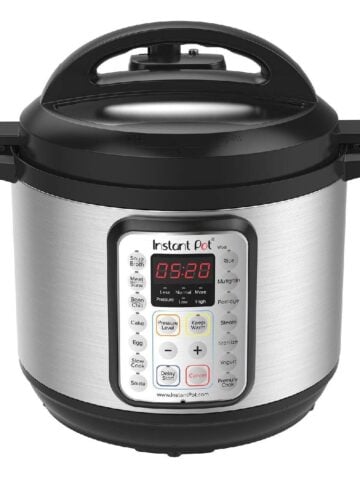
Are airfryers really healthier than deep fat fryers? It’s a question on many people’s minds these days as air fryers grow in popularity. This crispy food revolution promises all the flavor and texture of deep-frying but with less oil and supposedly greater health benefits.
Air-frying is known to reduce the formation of acrylamide by 90% compared to deep fat frying, thus emphasizing its health advantages. But, are air fryers healthy, or is it just hype?
As someone who has been air frying for years, I’ll take you through the facts below that will give you a bit more insight as to how healthy air fryers actually are. Let’s begin!
Jump to:
The Appeal of Air Fryers
Let’s face it, we love our fried foods. There’s something undeniably satisfying about that crispy, crunchy exterior and tender interior. However, while delicious, traditional deep-frying methods are often associated with health risks.
Deep-fried foods are typically high in calories and fat because they absorb so much cooking oil. This can lead to weight gain and increase the risk of heart disease. They often contain trans fats, notorious for their negative impact on cholesterol levels, further escalating cardiovascular risks.
If that wasn’t enough, the high temperature of deep frying foods can create harmful compounds like acrylamide, classified as a potential carcinogen. So, enter the air fryer, a glimmer of hope for health-conscious fried food enthusiasts.
Related: How Do I Prevent Acrylamide in My Air Fryer: Key Tips
How Air Fryers Work: Hot Air Circulation

Air fryers work through the magic of hot air circulation. These countertop heroes are equipped with a heating element and a powerful fan. They work by circulating extremely hot air around the food, creating that coveted crispy texture without submerging the food in oil.
Are Air Fryers Healthier? Examining the Evidence
Air frying healthy can be a better alternative to traditional deep-fried foods methods as it eliminates the need for added oils, reduces the intake of unhealthy fats, and preserves the goodness in vegetables and proteins.
Air fryers undoubtedly offer several advantages over traditional deep-fat fryers. This cooking method requires significantly less oil to achieve similar results, meaning fewer calories and fat content in your food. But do those benefits necessarily translate to a healthier meal? Let’s look at some research:
Also read: Can You Put Raw Meat in Air Fryer? Cooking Guide & Tips
Fat and Calorie Reduction: A Win for Air Fryers

One of the most significant advantages of using an air fryer is the reduction in fat and calories that comes from deep fried foods. Studies show air frying can reduce up to 90% of the oil left in food compared with deep-frying.
Less oil generally means fewer calories and less fat, making air-fried foods a potentially healthier option for weight management and heart health. For example, switching from deep-fried foods like French fries to fries cooked in an air fryer can save you a significant amount of calories and fat grams.
Now, let’s address the elephant in the room—acrylamide. Research shows that an air fryer can reduce acrylamide, the potentially carcinogenic compound formed during high-heat cooking, by up to 90% compared to deep fat frying.
However, even with air frying, acrylamide formation isn’t entirely eliminated, and other potentially harmful compounds might still develop. It’s always best to enjoy even your air-fried foods in moderation.
Impact on Nutrients
Cooking methods inevitably impact the nutritional value of food. While deep-fried foods leads to more nutrient loss, both air-frying and oven-baking preserve more vitamins and minerals due to shorter cooking times and less direct heat exposure. It's crucial to consider this aspect while evaluating the health implications.
Also read: Air Fryer Or Pressure Cooker: Which Appliance Reigns Supreme?
Glycemic Index and Blood Sugar
Some studies show that air-frying can positively impact the glycemic index (GI) of certain foods. For instance, research has found that air-frying potatoes increase their resistant starch content.
Because this type of starch is digested more slowly, it can potentially result in a lower and slower rise in blood sugar after a meal. However, it's crucial to consider your overall carbohydrate intake even when using an air fryer. Just because something is air-fried doesn't automatically make it a clear winner for carb-heavy meals.
Check out this: Which Air Fryer Causes Cancer? Myths, Facts, and Healthy Tips.
Air Fryer Limitations: A Balanced View

Although using an air fryer seems like a dream come true, there are limitations to consider. Unlike traditional deep fryers, air fryers may not achieve the same level of crispiness and can have longer cooking times.
Cooking Capacity: Not Ideal for Large Families
Air fryers typically come in smaller sizes (for example the Instant Vortex 2QT Mini Air Fryer and the Ninja AF101 4QT) compared to traditional ovens, limiting the amount of food you can cook food at once. This could be a drawback for large families or when preparing meals for a crowd.
Taste and Texture: Close but No Cigar?
Although air fryers mimic the satisfying crispiness of deep-fried foods, some argue the taste and texture don’t fully measure up to their deep-fried counterparts. While you’ll achieve a good crunch, don’t expect a complete replica of that decadent, deep-fried experience.
Air fryers can also be used to cook fried chicken with a crispy texture similar to traditional frying, but with minimal fat, making it a healthier cooking method.
Also read: Analog Vs Digital Air Fryer: Find Your Perfect Kitchen Companion
FAQ's
Yes, air fryers are generally safer than traditional frying methods. Traditional frying involves the use of hot oil, which poses several safety risks such as spills, splashes, and the potential for catching fire. Air fryers, on the other hand, do not require hot oil, eliminating these risks and making them a safer option for cooking.
Air fryers can be a good option for those looking to enjoy their favorite fried foods with less fat and calories. They're also generally considered safer than deep fryers since they use less oil and generate less heat.
However, this does not make them a completely healthy cooking method. It's still important to practice moderation and consume a balanced diet.
Both air frying and baking can be healthy cooking methods as they generally require little to no added oil. The healthfulness of the cooked food depends on various factors, including the type of food and the cooking temperature.
For example, air-frying chicken will generally be healthier than deep-frying it but may not be as healthy as baking it. It's always best to consult with a registered dietitian or a qualified healthcare professional for personalized dietary advice.
One of the biggest advantages of an air fryer is that you often need very little to no oil. You'll typically use a tablespoon or less of oil, if any. This significant reduction in oil makes a big difference in calorie and fat content.
However, it's essential to note that even with little to no oil, overconsumption of any food can contribute to excess calories. Moderation is always key.
Technically, an air fryer allows you to "fry" food without submerging it in oil. The circulating hot air creates a crispy texture similar to deep-frying. Some foods, like fish fillets, may benefit from a light spray of olive oil or avocado oil.
Ultimately, it depends on the food you are cooking and your preference. You can experiment with different oils and amounts to find what works best for you.
Conclusion
So, are air fryers healthy? Is air frying healthier than deep frying? They certainly have advantages. They're winners in reducing fat, calorie intake, and acrylamide formation while offering a more convenient way to enjoy crispy snacks and sides. Air fryers require minimal extra oil compared to what a deep fryer requires.
But, an air fryer is not an open invitation to eat fried food with reckless abandon. Like all things in life, balance and moderation are key to a healthy lifestyle. Also, remember that while air fryers are a healthier alternative, they are still considered kitchen gadgets, and you should prioritize a balanced approach for a healthy life. Happy air frying!










Leave a Reply